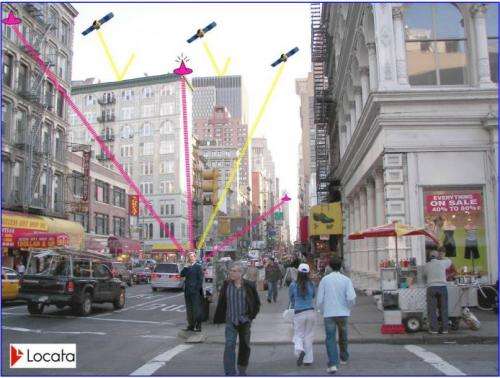January 4, 2013 report
Locata positioning hits ground at New Mexico missile range

(Phys.org)—A new positioning system can take on where GPS leaves off. An Australia-based company, Locata, is featuring a ground-based system using stronger signals than GPS for pinpointing a person's location indoors or outdoors. In place of satellites, Locata has developed technology that features ground-based equipment to project a radio signal over a localized area. A Locata network of small, ground-based transmitters blankets a chosen area with strong radio-positioning signals. This is a "terrestrially" based system capable of powerful signals, which can work in both internal and external environments.
The company's site points out that its technology does not rely on atomic clocks and yet its transmitters can achieve an extremely high level of synchronization. Locata's patented synchronization method is called TimeLoc. According to the site, Locata's transmitters are "chronologically 'locked' together."
The company's CEO, Nunzio Gambale, said Locata can be viewed as an important technology development for the future of the positioning industry. Interestingly, the U.S. military, which created the Global Positioning System (GPS) technology, has signed a contract involving the use of Locata technology at the White Sands Missile Range in New Mexico. This is a multiyear, multimillion dollar contract to install a ground-based LocataNet ("LocataNet" refers to a positioning network that can operate in combination with GPS or can operate independent of GPS) positioning system at the missile range. The USAF will field Locata's technology to supply "reference truth" positioning across a vast area when GPS is being completely jammed.
Locata works alongside GPS, rather than replacing it. The company makes it clear that Locata is "a local extension and expansion of GPS. It works with GPS, but can also operate independently when GPS is not robust or completely unavailable. "
Uses of Locata technology include the military and mining. Leica Geosystems Mining last year announced a partnership with Locata to provide the mining industry with a high-precision radio positioning system called the Leica Jigsaw Positioning System (Jps). Positioning fails in a mine if a significant number of the satellites are blocked. This happens especially in deep pits and against high walls. To address blocked satellite signals and downtime, Leica Jps was brought in, powered by Locata, in the form of a constellation of ground-based satellites, or alternative points of reference, to be used with or independent of the GPS satellite network.
Locata is also looking into units that could be small enough for smartphones, which might become available in the coming years.
More information: www.locatacorp.com/wp-content/ … June-2012-Public.pdf
© 2013 Phys.org



















